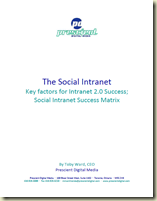 Prediction Markets have intrigued me for some time now. I've been reading about them in books such as 'The Wisdom of Crowds' and 'We are Smarter than Me' and 'Wikinomics'. The examples they give are inspiring. But still I find the number of examples, also on the Internet, quite limited. And I think I understand why now. I'll explain why below.
Prediction Markets have intrigued me for some time now. I've been reading about them in books such as 'The Wisdom of Crowds' and 'We are Smarter than Me' and 'Wikinomics'. The examples they give are inspiring. But still I find the number of examples, also on the Internet, quite limited. And I think I understand why now. I'll explain why below.
But first something great happened to me some time ago. For one I joined the 2.0 Adoption Council. Which is a great group of enterprise 2.0 practitioners and enthusiasts. It simply is a group of people in this area that want to learn from each other. And then recently the 2.0 Adoption Council set up a Prediction Market. Ah, this is great, I thought, it would give me the chance to experience a Prediction Markt in practice. So I jumped in!
This prediction market was focused on Enterprise 2.0 business and technology. Several statements in this area were put up and the market kicked off.
Every participant got $10.000 to use as virtual money. You could put money on a certain statement based on how convinced you were you'd get it right. But before you did that you'd be ask what the probability was the statement would come true.
This Prediction Market ran for a couple of months. The results will be used in a broader survey of the Enterprise 2.0. But now comes the greatest part of this whole experience: I won the Prediction Market! Wow, I knew my predictions weren't crazy, but with all these smart people in the e2.0 field I didn't think I would win. But I did. Here's a link to the post to prove it!
Back to why aren't prediction markets so visible? For one I think because we're still learning to use the "low-hanging fruit" of web 2.0 in enterprises. Like wiki's, blogs, rss and bookmarking. How do we use these interesting platform in daily corporate practice? How do we get employees to understand their underlying concepts? Etc.
Another reason is the fact that although the idea of a prediction market is easy to understand, actually participating in one isn't. It's not extremely difficult, but it not easy to just click away. You have to have some understanding of statistics. You have to understand how a normal distribution works.
A final reason - that I could come up with - is many people think you need a very large number of participants for a prediction market to be useful and accurate. Crowdcast told me this is not true. They get very good results with groups of 50-75 participants.
So, we have some explaining to do, which is good anyway. My next steps are to look for areas within the company I work for and experiment with Markets. And, I'm also looking for money to go to the Enterprise 2.0 conference in Boston. My prize for winning the Market is a full-conference pass! Now I just need to get their by plane and stay in a hotel somewhere.
 Recently intranet expert Toby Ward of Prescient Digital Media published an interesting whitepaper 'The Social Intranet. Key Factors for Intranet 2.0 Success; Social Intranet Success Matrix'. The whitepaper is based on Toby's expertise in this area and an extensive survey.
Recently intranet expert Toby Ward of Prescient Digital Media published an interesting whitepaper 'The Social Intranet. Key Factors for Intranet 2.0 Success; Social Intranet Success Matrix'. The whitepaper is based on Toby's expertise in this area and an extensive survey. I've been looking around at how companies use blogs. I see several types of blogs:
I've been looking around at how companies use blogs. I see several types of blogs:

